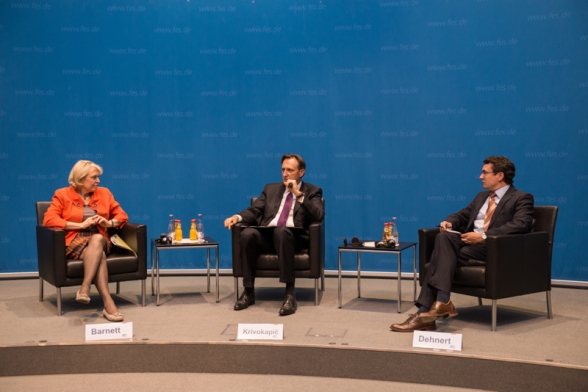Mr Krivokapić informed the attendees on breakthroughs that the OSCE PS have achieved so far in organising a joint meeting between the delegations of Ukraine and the Russian Federation in the OSCE PA, during early April, as well as on the intention of intensifying political dialogue on this topic at the highest level during the Annual Session of the Parliamentary Assembly, which is to be held in Azerbaijan.
In the continuation, Mr Krivokapić commented on the need for including new tools in the range of mechanisms of the OSCE, through improvement of the Helsinki Document. "In the year before the Jubilee, the 40 years since signing the Helsinki Final Act, executive and legislative branches of the OSCE entered the so-called "Helsinki +40 process", with the intention to further strengthen the OSCE as a whole. There is a lot to be done and the following months will be decisive for the organisation. Project Helsinki +40 OSCE PA will bring together politicians, academic community and international experts to jointly explore the use of new tools and methods for improvement, with a special focus on empowerment and promotion of the role of parliamentary diplomacy. The intention of this project is to result in strengthening of activation and contribution of the OSCE in resolving conflicts. Since the foundation of the OSCE, the need for it as well-functioning, efficient and effective organisation within the European and global security has never been stronger", Mr Krivokapić said in his speech.
Ms Doris Barnett, Member of the Bundestag and Vice President of the OSCE PA spoke at the panel, saying that the dignity and prestige of the OSCE Parliamentary Assembly, which has been regarded highly for a long time, was finally returned during the last year when the role of MPs in resolving the Ukrainian crisis was concretised.
In the same capacity, Mr Krivokapić visited the German Institute for International and Security Affairs, where a discussion on the current situation in Ukraine was organised and participants shared views on the results of the OSCE observation mission during the presidential election; Mr Krivopkapić also visited the German Society for International Affairs, where he spoke with Mr Paul Fonmalcan, Secretary General of the Society.
Mr Krivokapić also spoke with Ms Maria Böhmer, Minister of State in the Ministry of Foreign Affairs. At the meeting with Ms Böhmer, the interlocutors discussed the current developments in the OSCE region, emphasising the fact stability was essential for citizens of Ukraine, which was impossible to achieve with a lack of hope and lack of confidence in the institutions.
In Berlin, Mr Krivokapić met with Mr Frank-Walter Steinmeier, Foreign Minister of Germany, with whom he discussed the Ukrainian crisis and the position of Montenegro in the Euro-Atlantic integration. Minister Steinmeier thanked to President Krivokapić for the important contribution which the Parliamentary Assembly and he personally had been giving to the stabilisation of democracy in Ukraine. They jointly assessed that Montenegro has made great progress towards NATO integration, and that it must continue its efforts in order to improve results in key areas of mutual interest.
During his stay in Berlin, Mr Krivokapić is being accompanied by the Ambassador of the OSCE Parliamentary Assembly in Vienna, Mr Andreas Nothelle.









